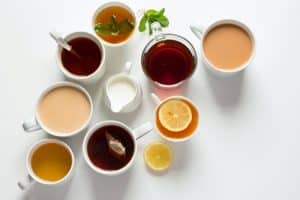There are many benefits of coffee and tea, but which is better for your health? Read on to learn about Cold-brew coffee, EGCG, and L-theanine, which is better for you. Both beverages contain caffeine, but tea is better for your health than coffee. Both are also good sources of antioxidants. Depending on the type of coffee or tea you drink, you might enjoy one.
Black coffee
There are many reasons why you should consider drinking black coffee. For one, it contains high levels of antioxidants. These antioxidants have been shown to protect the liver from fatty buildup. Moreover, black coffee can improve the performance of essential liver enzymes. Drinking two or more cups of coffee daily is associated with a decreased risk of hepatitis, liver cancer, and fibrosis of the liver. Additionally, black coffee contains caffeine and may be beneficial to your health.
Another reason to drink black coffee is that it boosts metabolism and provides energy for workouts. Black coffee also contains antioxidants and is rich in magnesium and potassium. Both of them help lower the risk of Type 2 diabetes and obesity. However, black coffee has more caffeine than green or white tea. Furthermore, both beverages improve your immune system. For this reason, it is better to choose a black liquid over a green one. Besides, you can also drink black tea if you don’t like caffeine.
Cold-brew coffee
There are several health benefits of drinking cold-brew coffee over tea. The caffeine in coffee has been found to benefit the brain, reducing the risk of dementia, Alzheimer’s disease, and other mental disorders. In addition, cold brew is less acidic and may taste better. It may eliminate the need for sugar, cream, and other additives that add calories. The caffeine in cold-brew coffee may also help prevent cardiovascular disease.
Cold brew is lower in acidity than hot coffee, making it easier on the stomach and causing less acid reflux. The smoother taste of cold medicine may also make it more appealing to those with gastrointestinal problems. This can make cold brew more attractive to some people and lead to lower consumption of sugar and cream in their daily regimen. However, coffee drinkers should proceed with caution. The disadvantages far outweigh the benefits of cold brew.
Another advantage to cold-brew coffee is keeping it for days in the refrigerator. While hot coffee tends to go stale after one day, cold brew can stay fresh for two weeks in the fridge. And because the brewing time is longer, the solubles are more plentiful. The health benefits of cold-brew coffee are numerous, and it’s worth trying it at your local café or restaurant.
EGG
Studies have shown that drinking more than five cups of green tea a day has a beneficial effect on your health. Green teas typically contain 70-120 mg of EGCG per gram of dry leaf. The benefits of drinking green tea are most significant when consumed in larger doses than coffee. However, there are limitations to both tea and coffee. In moderation, both may provide health benefits.
The polyphenols and antioxidants in tea have been linked to various health benefits. Epigallocatechin gallate is the most potent of these antioxidants. Recent studies have shown that tea drinkers have a lower risk of cancer and diabetes. Additionally, regular tea drinkers experience lower cardiovascular disease and stroke. This may be due to the anti-inflammatory properties of tea and its polyphenol content. On the other hand, drinking coffee can increase the risk of cardiovascular disease.
The benefits of coffee over tea are the same, but the effects are different. Coffee has a higher concentration of caffeine than tea, and the latter is a better choice if you want to reduce your risk of heart disease. Drinking tea and coffee is essential for your health, but do not consume more than 5 cups per day if you are unsure what works best for you. You should also pay attention to your body’s reaction to caffeine. It’s best to consult a doctor before consuming more than this recommended amount.
L-theanine
Some coffee lovers argue that L-theanine in coffee is better for them than tea, but others say the reverse is true. There’s plenty of research to support both sides. Coffee contains more L-theanine than tea, but tea is still better than coffee in many ways, including taste. Whether l-theanine in coffee is better than in tea depends on your personal preferences, but the best combination is 200 mg of l-theanine for every 100 mg of caffeine.
Researchers found that combining theanine with caffeine increased attention in a recent study. This was a result of the addition of L-theanine to coffee. Combining the two can improve focus, reduce anxiety, and help you relax. Studies have shown that caffeine alone can reduce the benefits of theanine, but coffee has higher levels of this amino acid. It may even help those with ADHD since caffeine has a calming effect.
Antioxidants
Both coffee and tea contain polyphenols, or antioxidants, which are thought to have anti-inflammatory benefits. In studies, tea and coffee have been linked to lower cancer and heart disease risks and more robust immune systems. Green tea, for example, contains potent polyphenols and antioxidants known as catechins, which may help with brain health. Black tea is also a rich source of antioxidants. Nevertheless, you may be wondering whether coffee is better for antioxidants.
Coffee is rich in antioxidants and is often associated with a longer lifespan. However, coffee can be addictive, and more than four cups per day may cause adverse side effects. The study also found that drinking coffee can lead to kidney and bone diseases. Drinking coffee may be better for your health, but you should monitor how much you drink—drinking more coffee than tea can have adverse effects. Instead, limit yourself to four to five cups per day to get the most antioxidant benefits.
Both tea and coffee are high in polyphenols, which may prevent damage from free radicals. They may also help prevent cancer. Compared to tea, coffee contains more antioxidants. Green tea contains a component called epigallocatechin-3 gallate, while black tea contains theaflavins. Both teams are good additions to a balanced diet. Consider incorporating both into your daily routine if you’re looking for health benefits.
Energy boost

Compared to energy drinks, coffee has less sugar and is a better source of natural vitamins and minerals. Energy drinks have added sugars and additives that are not healthy for your body. In addition, they are easier to consume on the go. Coffee, however, is best enjoyed in moderation. While energy drinks may be easier to find and destroy, you should consider the adverse side effects of caffeine over tea. Coffee is better for your overall health, but you need to balance your intake with your lifestyle.
Both tea and coffee contain caffeine, linked to numerous health benefits. Caffeine is the most common psychoactive drug globally, and the effects of drinking either can last from 45 minutes to an hour. Both contain caffeine in different amounts. Therefore, the amount of caffeine in either beverage is additional, and the amount you drink will depend on your needs and health goals. Those who are caffeine-sensitive should limit their intake to one or two cups per day, while those who can drink more should limit it to four or five cups a day.
Spices
You probably don’t like the taste of coffee, but the truth is that coffee is healthier for your body and mind. Coffee is a perfect part of a healthy diet, so it’s not a bad idea to enjoy it as part of it. However, coffee can become unhealthy when adding spiral mountains of cream or flavored syrups. Instead, add natural spices like cinnamon to your coffee to enhance its taste and antioxidants.
One of the most popular spices, cinnamon, is often associated with coffee. It adds a warm, spicy aroma with a camphor-lemon aftertaste. You can purchase cinnamon sticks or buy whole pods, but keep in mind that ground cardamom will quickly lose its aroma and flavor. You can also try nutmeg, which is less spicy but has a nutty taste.
A study by the University of Illinois revealed that cinnamon has antioxidants that help process information. Participants in the study exhibited improved attention after ingesting cinnamon. Unlike sugar, cinnamon also positively impacts your health, improving your insulin function, reducing cholesterol, and preventing inflammation in the body. It even enhances cognitive processing and reduces the risk of heart disease. Adding a pinch of cinnamon to your coffee might be a perfect choice for those sensitive to caffeine.
Drinking ritual
Although there is little disagreement over the benefits of coffee and tea, both beverages contain caffeine. Both drinks are also rich in antioxidants and polyphenols, which researchers are studying. These compounds may help fight cancer, but they also have different effects on the body. While tea is better for your heart, coffee may be better for your waistline. Researchers have also compared the results. Of tea and coffee on people with heart disease. Both beverages are healthy additions to a balanced diet.
For people who enjoy rituals, drinking tea is an excellent alternative to coffee. In addition to the high-quality caffeine content, tea also offers a variety of flavors and is the best beverage for those who like to experiment with flavorings. Adding lemon or mint is a great way to add flavor to a cup of tea. And for those who want to make it even more exciting, tea is the perfect drink to accompany a meal.





